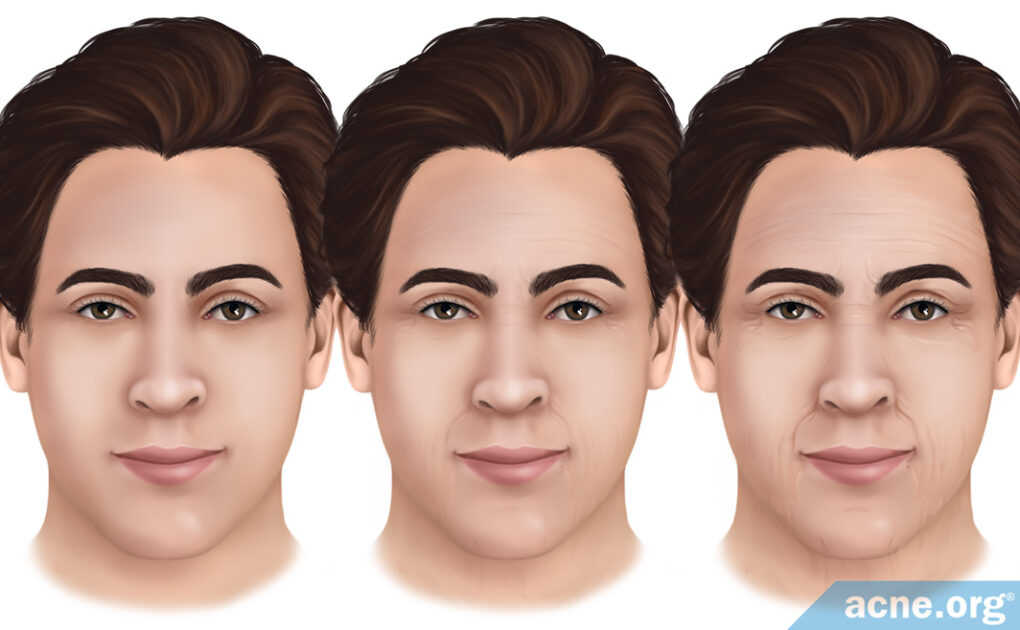Because of a Lack of Long Follow-Up Studies, This Remains Unknown

The Essential Info
Isotretinoin, often know by its original brand name Accutane®, is an oral medication that treats severe cystic acne by decreasing skin oil production.
How isotretinoin might lead to skin aging in the long term: Isotretinoin may cause a prolonged reduction of skin oil and lingering skin dryness. Whether this will cause the skin to prematurely show signs of aging like thin skin and/or wrinkles will require longer-term follow-up studies.
How isotretinoin may actually help with skin aging in the short term: On the other hand, five studies have actually shown an improvement in signs of skin aging in middle-aged people and seniors taking isotretinoin in the short term.
The Bottom Line: Isotretinoin is by all accounts a hardcore medication that powerfully and permanently alters the skin, and can lead to some users suffering with lifelong side effects of the skin and the rest of the body. This is why it is approved only for severe, scarring acne that does not respond to other treatments. Whether it causes more long-term aging is one more consideration that needs to be weighed carefully before taking it.

The Science
- Isotretinoin Dries the Skin
- Does the Permanent Dryness Isotretinoin Causes Lead to Premature Skin Aging?
- Five Studies Show Isotretinoin May Actually Treat Short-Term Skin Aging
- The Bottom Line
Isotretinoin, often referred to by its original brand name, Accutane®, is an oral medication that is approved to treat severe cystic acne. It permanently reduces skin oil levels and can result in dryer skin in the long term.
It is unclear whether these effects can cause the skin to age more quickly, but is a concern of many people who are considering the drug or who have taken it in the past.1-4
First, let’s look at the characteristics of aged skin:
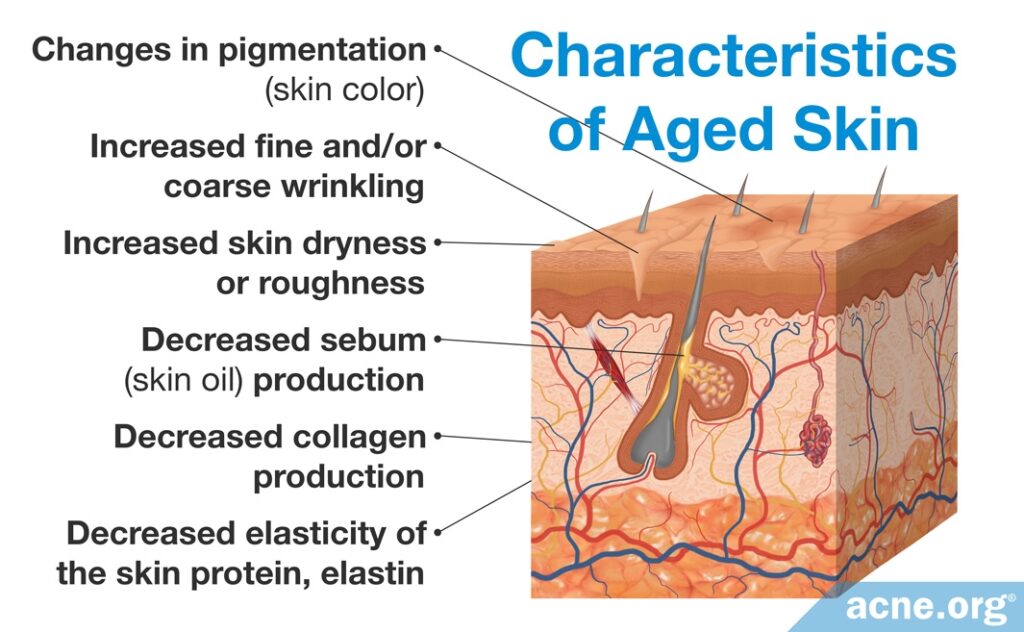
- Increased skin dryness or roughness
- Increased fine and/or coarse wrinkling
- Changes in pigmentation (skin color)
- Decreased skin oil (sebum) production
- Decreased collagen production
- Decreased elasticity of the skin protein, elastin5-8
Isotretinoin Dries the Skin
If you speak with anyone who has taken isotretinoin, they will tell you that their skin was extremely dry while on the drug. In fact, dry, flaky, and even cracked and bleeding skin and lips is how doctors know isotretinoin is working.
People who took isotretinoin in the past will also often tell you that along with enjoying permanently clearer skin, their skin remained permanently dryer as well. A common complaint amongst people who have taken the drug is the necessity to use lip balm several times a day for the rest of their life.
To put it succinctly, isotretinoin’s ability to dramatically reduce skin oil levels and permanently “dry out” the skin is what makes it so effective against acne, but also what causes concern when it comes to the potential for long-term skin aging.
Any discussion about isotretinoin’s side effects must also include its other potentially severe side effects, as noted in the drawer below.
Expand to read about isotretinoin’s side effects
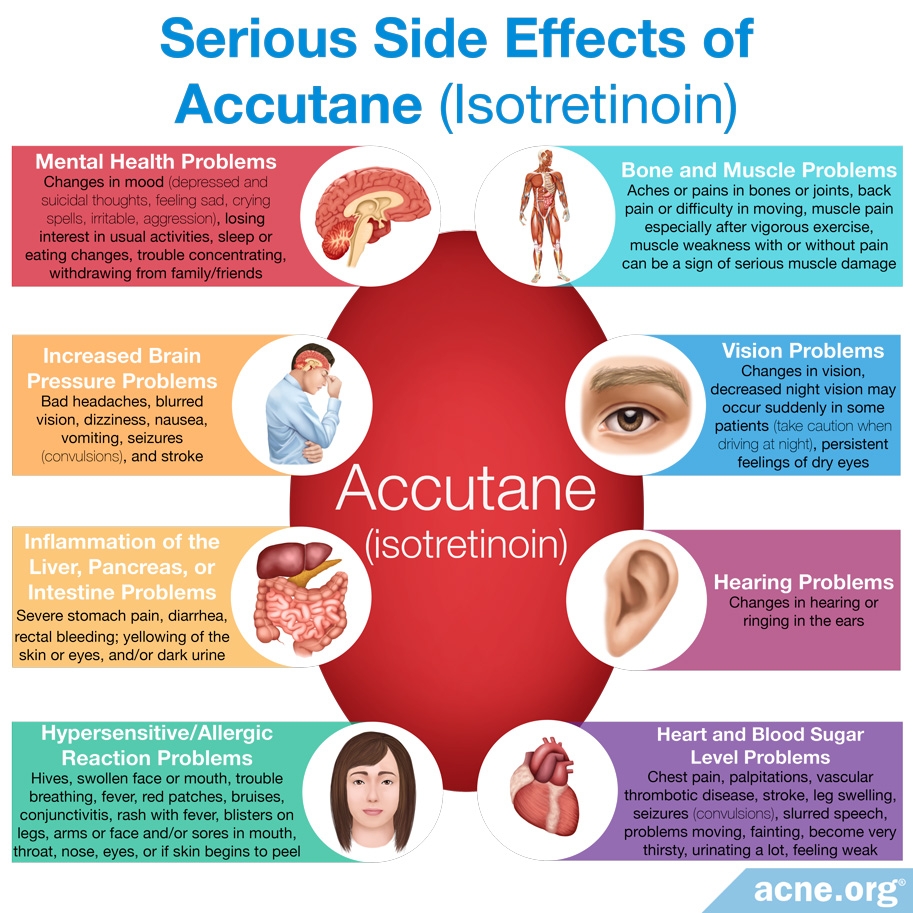
Isotretinoin causes numerous changes in the skin, some of which are intended, and some of which are side effects.
Intended skin changes
- Decreased sebum production, which reduces acne bacteria
- Reduced skin inflammation
- Increased skin cell shedding and replacement
Side effects of isotretinoin
- Increased skin dryness (short term & long term)
- Increased skin thickness (short term)
- Inflammation of the lips and eye (short term)
- Dry eyes (usually short term)
- Changes in blood lipid levels (short term)
- Impaired liver function (short term)
- Fetal abnormalities in pregnant women (catastrophic, including death)
Almost all people taking isotretinoin will experience one or more of these side effects while on the medication.1,3,9-14
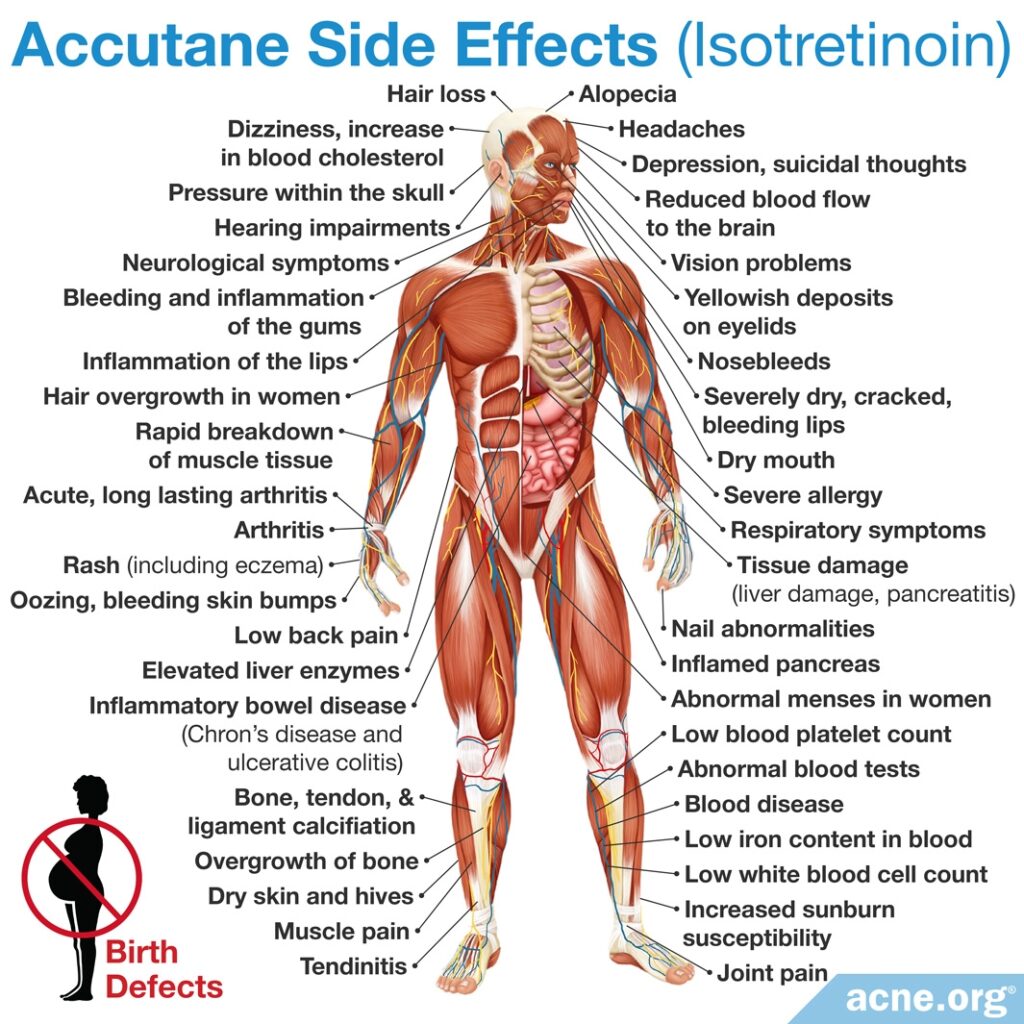
Does the Permanent Dryness Isotretinoin Causes Lead to Premature Skin Aging?
Scientists have never looked at the long-term effect of isotretinoin on signs of skin aging. However, two studies have been performed in an attempt to identify how long the effects of isotretinoin last after stopping treatment, and we can get some clues from these studies.1,3,9,11,12
Study 1: The first study followed people for one year and found that isotretinoin continues to reduce the level of sebum the skin produces for one year following treatment, and continues to produce skin dryness. No studies examined if this effect lasts longer than a year, but many people who have taken isotretinoin can attest to permanent changes in their skin.
Study 2: The second study followed patients for 4 – 9 years following isotretinoin treatment. The researchers found that 4 – 8% of patients reported long-term side effects. However, as we have noted, this study did not look at signs of skin aging.
So what’s the verdict? Unfortunately, we simply can’t say based on the data we have. However, many anecdotal accounts of faster skin aging after isotretinoin abound on the Internet. While we have to stay extremely vigilant not to draw conclusions from anecdotal online reports, it does make common sense that isotretinoin might lead to faster skin aging based on its ability to permanently and irreversibly reduce the natural skin oil levels of the skin.
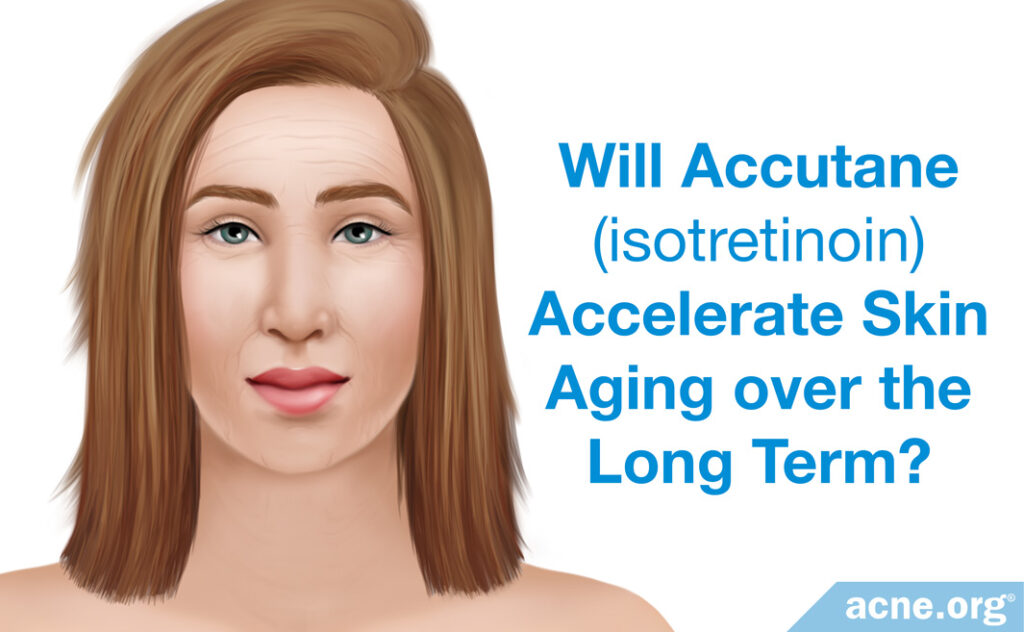
Five Studies Show Isotretinoin May Actually Treat Short-Term Skin Aging
To make matters even more confusing, five studies performed on middle-aged people and senior citizens have found that taking a low dose of isotretinoin for 3-6 months may actually reduce the signs of skin aging.
It is important to note that:
- None of the studies looked at patients younger than 40 years old
- None of the studies followed up with the patients for more than a few months
In other words, it is impossible to say whether isotretinoin would have a similar anti-aging effect in younger people, and it we also don’t know whether the anti-aging effect noticed in these studies is lasting. But this research is interesting and points toward the possibility that isotretinoin might not cause problems with skin aging, and may in fact help with skin aging at least in the short term.
Expand to read details of these five studies

The first study, published in 2009 in the Journal of the European Academy of Dermatology and Venereology, tested isotretinoin on photoaged skin. “Photoaged skin” is skin that has aged due to chronic sun exposure. To test the impact of isotretinoin on photoaged skin, scientists compared the pigmentation of patients before and after taking isotretinoin. Thirty women between the ages of 40 and 55 took isotretinoin 3 times a week for 3 months. The researchers found that oral isotretinoin resulted in a short-term improvement in the appearance of photoaged skin, and concluded that isotretinoin may treat photoaging.13

Another study, published in 2006 in the German journal Die Pharmazie, found that isotretinoin may increase the thickness of the skin layer in the short term, which may decrease the appearance of aging.10 However, we should note that this study was performed on mice, not humans.

Another study published in 2008 in the journal SKINmed looked at the effects of oral isotretinoin on skin aging in women. The participants, 50 women between the ages of 40 and 60 years, took 20 mg of oral isotretinoin 3 times a week for 3 months. By analyzing photographs taken before and after the treatment, the researchers concluded that oral isotretinoin reduced signs of skin aging in these patients.15

Yet another study, published in 2014 in the International Journal of Dermatology, tested the effects of oral isotretinoin on men and women over 50 years of age. Twelve men and women between the ages of 50 and 75 years took oral isotretinoin for six months. At the end of this period, the researchers detected greater skin thickness, elasticity, and amount of collagen (a protein that makes the skin firm), all of which are signs of reduced aging. In addition, the scientists noted an overall improvement in the appearance of the skin.16

Finally, a study published in the Brazilian journal Anais Brasileiros de Dermatologia in 2015 tested oral isotretinoin on middle-aged women. The participants, 20 women between the ages of 40 and 50, took 20 mg oral isotretinoin 3 times a week for 12 weeks. The researchers examined the skin of the women before and after taking isotretinoin. They observed the following improvements in signs of skin aging:
- Increased amount of elastic fibers (stringy proteins that make the skin stretchy) in 65% of the women
- Increased amount of collagen in 60% of the women
In other words, taking isotretinoin for 3 months improved some signs of skin aging in these middle-aged women.17
The Bottom Line
Because long follow-up studies are severely limited, no one knows how isotretinoin affects long-term skin aging. This is one more variable to keep in mind if you are considering isotretinoin as a treatment.
References
- Leyden, J. J., Del Rosso, J. Q. & Baum, E. W. The use of isotretinoin in the treatment of acne vulgaris: clinical considerations and future directions. J. Clin. Aesthet. Dermatol. 7, S3 – S21 (2014). https://www.ncbi.nlm.nih.gov/pubmed/24688620
- Mukherjee, S. et al. Retinoids in the treatment of skin aging: an overview of clinical efficacy and safety. Clin. Interv. Aging. 1, 327 – 348 (2006). https://www.ncbi.nlm.nih.gov/pubmed/18046911
- Layton, A. The use of isotretinoin in acne. Dermatoendocrinol. 1, 162 – 169 (2009). https://www.ncbi.nlm.nih.gov/pmc/articles/PMC2835909/
- Nelson, A. M. et al. Temporal changes in gene expression in the skin of patients treated with isotretinoin provide insight into its mechanism of action. Dermatoendocrinol. 1, 177 – 187 (2009). https://www.ncbi.nlm.nih.gov/pmc/articles/PMC2835911/
- Gragnani, A.et al. Review of Major Theories of Skin Aging. Adv. Aging Res. 3, 265 – 284 (2014). https://www.researchgate.net/publication/276525909_Review_of_Major_Theories_of_Skin_Aging
- Ganceviciene, R., Liakou, A. I., Theodoridis, A., Makrantonaki, E. & Zouboulis, C. C. Skin anti-aging strategies. Dermatoendocrinol. 4, 308 – 319 (2012). https://www.ncbi.nlm.nih.gov/pubmed/23467476
- Naval, J., Alonso, V. & Herranz, M. A. Genetic polymorphisms and skin aging: The identification of population genotypic groups holds potential for personalized treatments. Clin. Cosmet. Investig. Dermatol. 7, 207 – 214 (2014). https://www.ncbi.nlm.nih.gov/pubmed/25061327
- Pochi, P. E., Strauss, J. S. & Downing, D. T. Age-related changes in sebaceous gland activity. J. Invest. Dermatol. 73, 108 – 111 (1979). https://www.sciencedirect.com/science/article/pii/S0022202X15455538
- Bagatin, E. et al. A randomized and controlled trial about the use of oral isotretinoin for photoaging. Int. J. Dermatol. 49, 207 – 214 (2010). https://www.ncbi.nlm.nih.gov/pubmed/20465648
- Tadini, K. A., Gaspar, L. R. & Maia Campos, P. M. Epidermal effects of tretinoin and isotretinoin: Influence of isomerism. Pharmazie 61, 453 – 456 (2006). https://www.ncbi.nlm.nih.gov/pubmed/16724545
- Goulden, V., Layton, A. M. & Cunliffe, W. J. Long-term safety of isotretinoin as a treatment for acne vulgaris. Br. J. Dermatol. 131, 360 – 3 (1994). https://www.ncbi.nlm.nih.gov/pubmed/7918010
- Goldstein, J. A. et al. Comparative effect of isotretinoin and etretinate on acne and sebaceous gland secretion. J. Am. Acad. Dermatol. 6, 760 – 765 (1982). https://www.ncbi.nlm.nih.gov/pubmed/6461679
- Rabello-Fonseca, R. et al. Oral isotretinoin in photoaging: clinical and histopathological evidence of efficacy of an off-label indication. J. Eur. Acad. Dermatol. Venereol. 23, 115 – 123 (2009). https://www.ncbi.nlm.nih.gov/pubmed/18811602
- Rademaker, M. Adverse effects of isotretinoin: A retrospective review of 1743 patients started on isotretinoin. Australas. J. Dermatol. 51, 248 – 253 (2010). https://www.ncbi.nlm.nih.gov/pubmed/21198520
- Kalil, C. L., Fachinello, F. Z., Lamb, F. M. & Comunello, L. N. Use of oral isotretinoin in photoaging therapy. SKINmed. 7, 10-14 (2008). https://www.ncbi.nlm.nih.gov/pubmed/18174796
- Bagatin, E., Guadanhim, L. R., Enokihara, M. M., Sanudo, A., Talarico, S., Miot, H. A. & Gibson L. Low-dose oral isotretinoin versus topical retinoic acid for photoaging: a randomized, comparative study. Int. J. Dermatol. 53, 114-22 (2014). https://www.ncbi.nlm.nih.gov/pubmed/24168514
- Bravo, B. S., Azulay, D. R., Luiz, R. R., Mandarim-De-Lacerda, C. A., Cuzzi, T. & Azulay, M. M. Oral isotretinoin in photoaging: objective histological evidence of efficacy and durability. An. Bras. Dermatol. 90, 479-486 (2015). https://www.ncbi.nlm.nih.gov/pubmed/26375216
